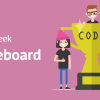EU Code Week
EU Code Week is a European grassroots initiative, organised in October every year. Code Week aims at awakening citizens' and especially children’s and teenagers’ interest in coding, computational thinking, robotics, and related digital skills. Millions of participants, including schools, institutions and people of all ages, cultures and backgrounds take part in the initiative each year.
About EU Code Week
EU Code Week is led by volunteers. Activities are organised by teachers, coaches, private companies, NGOs and many other bodies and coding enthusiasts, who all have the objective to bring programming and coding within everybody's reach, from children and younger people to parents and older persons. EU Code Week is also supported by the European Commission and Education Ministries of EU Member States, including neighbouring countries from the Western Balkans.
The primary target group are teachers, irrespective of subject taught and previous knowledge of coding, who would like to introduce their pupils to computational thinking. EU Code Week offers tutorials, lesson plans, teach and learn resources as well as free training courses for teachers.
During EU Code Week, participants have the chance to explore what computational thinking, coding, robotics, and computer skills actually are. They will learn more about digital skills and why these are important - and have fun while tinkering some hardware.
Why is this a good practice?
EU Code Week is one of the most well-known and internationally recognised EU initiatives with a proven impact on its target audience. More than 90% of the activities of EU Code Week in 2019 took place in various schools, reaching students with an average age of 11.
Since its launch in 2013, Europe Code Week has grown to represent an annual global event with a remarkable outreach and scalability potential: from 2015 to 2020, the number of activities, organised under the umbrella of the initiative, increased more than 10 times - from 7,600 to more than 70,000. In 2019, more than 4 million participants from all over the world took part and activities have spread well beyond the EU (to 80 countries in total). In 2021, results were similar: 4 million people in more than 80 countries around the world took part in EU Code Week.
Today, EU Code Week represents a flagship annual event, which is simultaneously easily scalable and replicable (due to a decentralised organisational structure via the network of volunteers; and the availability of open and free activities and accessible learning resources). As such, it has been successful in engaging and animating a wide community of key stakeholders - from industry partners to public institutions and not-for-profit organisations, and strong community involvement has contributed to the initiative's impact.
Join this year's Code Week!
The 2024 edition of EU Code Week will take place between 14-27 October 2024. Find out more here.





